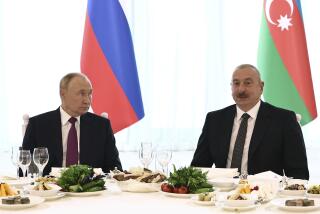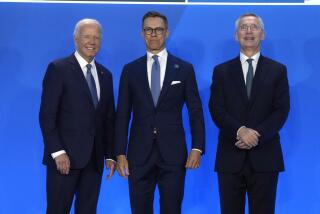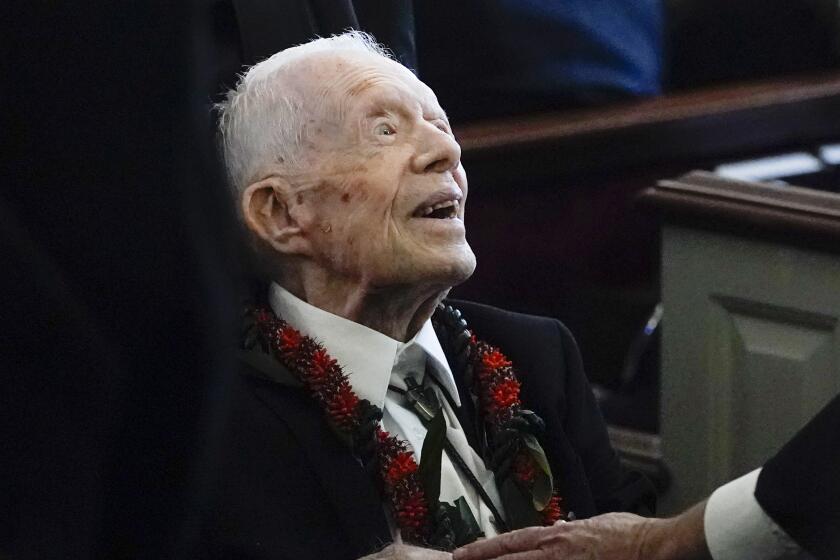Leaders of Japan, Russia Meet to Thaw Relations
With a little fishing, a little boating and a little patience with the Siberian snow and drizzle, Russian President Boris N. Yeltsin and Japanese Prime Minister Ryutaro Hashimoto on Saturday hacked away at the ice that has paralyzed their countries’ relations for half a century.
Their meeting at a muddy forest resort here on the Yenisey River created a warm, reflective atmosphere for the first postwar Russian-Japanese summit in Russia, spurring a declaration that the two will make efforts to at last sign a World War II peace treaty by 2000 and put their official relations on a normal course.
“The president and I have agreed to aim for a year 2000 signature of the peace treaty,” Hashimoto told reporters this morning.
The leaders also vowed Saturday, on the first day of their two-day summit, to pursue joint projects and an economic relationship that will benefit both sides.
“This day was very successful--I would even say more successful than anyone expected,” Yeltsin spokesman Sergei V. Yastrzhembsky effused after the two leaders had spent an afternoon casually endorsing plans for cooperation in oil extraction, nuclear technology, high-tech training and a much-needed upgrade of the Trans-Siberian Railroad.
The atmospheric breakthrough after 50 years of mutual silent treatment came amid the evolving acknowledgment by both sides that the subject of their standoff--sovereignty over four barren, wind-swept islands known as the southern Kurils--should not be allowed to continue shutting Japan out of the economic revolution transforming Russia.
*
Despite Japan’s wealth and proximity to the Russian Far East, where much of this country’s mineral resources are embedded, its investments in Russia have been few compared with those of Western Europe and the United States. Bilateral trade has also been unnaturally light for the two Pacific neighbors--it peaked in 1990 and has since dropped by 63% to less than $5 billion last year.
But the ambitious plan unveiled at this Siberian summit envisions broad joint action to put Japanese technology and know-how to work in revitalizing Russian industry in exchange for energy and security--via increased military cooperation--from Moscow.
Yastrzhembsky said specifics on the numerous development deals will be worked out over the next few weeks by a joint government commission.
Yeltsin and Hashimoto also agreed to step up military cooperation in the form of exchange visits by their general staffs. Japan pledged to back Russia’s application for membership in the Asia-Pacific Economic Cooperation forum, probably a quid pro quo for Moscow’s support for Japan’s quest for a permanent seat on the U.N. Security Council.
During their talks and outdoor ambling, Yeltsin also agreed to pay a similar “no-neckties” visit to Japan next spring, a date for which is expected to be set at the conclusion of the Krasnoyarsk meeting today.
The tightening of both economic and military ties reflects Russia’s need for investment to overcome the economic shambles left by communism and Japan’s desire to build new security bridges in a region increasingly dominated by China.
Energy is another imperative for Tokyo because Japan has no energy resources of its own and apparently will not be able to reach its goal of expanding its nuclear program because of a series of accidents and public opposition.
Russia and Japan began talking seriously about potential areas of cooperation during a meeting between Yeltsin and Hashimoto in Denver in June, when the Group of Seven industrialized nations drew Russia into the annual economic talks for the first time. The meeting was also a first in that the Kurils issue was not presented as a barrier to other forms of cooperation.
Yeltsin has signaled that the Kremlin is in no hurry to settle the Kurils dispute and instead believes that the conflict will best be eased by strengthened economic cooperation and interdependence.
But warming up relations is clearly a priority with both countries now, despite nationalists making it difficult for Yeltsin or Hashimoto to appear too “soft” on the sovereignty issue.
The two leaders resorted to reliance on their common interests to break the diplomatic ice here in Krasnoyarsk, where they set off despite an icy drizzle on a cutter plying the Yenisey for a brief session of angling. Only one fish was caught--by Hashimoto.
The Japanese leader had arrived at the Sosna resort with an armload of gifts for Yeltsin, including a new fishing rod and tackle, equipment for the kendo fencing sport and a camera like the one he pulled out to snap a shot of Yeltsin as the Russian approached him for the traditional welcoming bear hug.
“We shouldn’t underestimate the personal factor with Hashimoto and Yeltsin,” said Alexander Khokhoyev, first secretary at the Russian Embassy in Tokyo. “They are both interested in making a leap ahead--not a step, but a leap.”
*
Williams reported from Krasnoyarsk and Efron from Tokyo.
More to Read
Sign up for Essential California
The most important California stories and recommendations in your inbox every morning.
You may occasionally receive promotional content from the Los Angeles Times.











